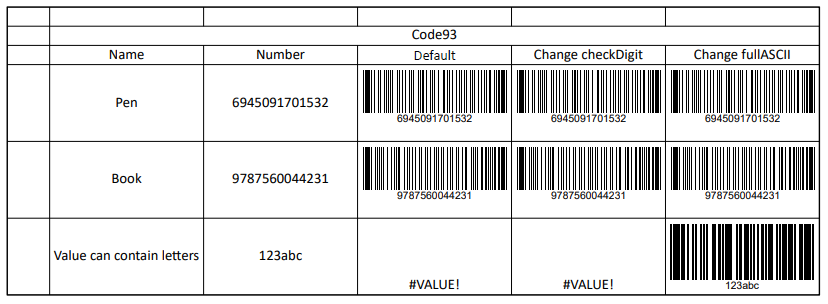Code93 barcode is a barcode that uses uppercase characters and numeric characters along with some special characters ("%" , "*", "$", "/", "." , "-", "+"). It is used primarily by Canada Post to encode supplementary delivery information.
The below image displays Code93 barcode in a PDF document.

You can set Code93 in a worksheet using the following formula:
=BC_CODE93(value, color, backgroudColor, showLabel, labelPosition, checkDigit, fullASCII, fontFamily, fontStyle, fontWeight, fontTextDecoration, fontTextAlign, fontSize, quietZoneLeft, quietZoneRight, quietZoneTop, quietZoneBottom)
| Name | Description |
|---|---|
| value | A string that represents encode on the symbol of Code93. |
| color | A color that represents the barcode color. The default value is 'rgb(0,0,0)'. |
| backgroundColor | A color that represents the barcode backgroundcolor. The default value is 'rgb(255, 255, 255)' |
| showLabel | Specifies whether to show label text when the barcode has label. |
| labelPosition | A value that represents the label position when the label is shown. |
| checkDigit | Specifies whether the symbol needs a check digit. The default value is 'false'. |
| fullASCII | Specifies whether to support full ASCII for Code93. The default value is 'false'. |
| fontFamily | A string that represents the label text fontFamily. The default value is 'sans-serif'. |
| fontStyle | A string that represents the label text fontStyle. The default value is 'normal'. |
| fontWeight | A string that represents the label text fontWeight. The default value is 'normal'. |
| fontTextDecoration | A string that represents the label text fontTextDecoration. The default value is 'none'. |
| fontTextAlign | A string that represents the label text fontTextAlign. The default value is 'center'. |
| fontSize | A string that represents the label text fontSize. The default value is '12px'. |
| quietZoneLeft | A value that represents the size of left quiet zone. |
| quietZoneRight | A value that represents the size of right quiet zone. |
| quietZoneTop | A value that represents the size of top quiet zone. |
| quietZoneBottom | A value that represents the size of bottom quiet zone. |
This example code sets Code93 in the worksheet.
| C# |
Copy Code |
|---|---|
// Create a new workbook var workbook = new GrapeCity.Documents.Excel.Workbook(); // Set worksheet layout and data IWorksheet worksheet = workbook.Worksheets[0]; worksheet.Range["B:F"].ColumnWidth = 20; worksheet.Range["4:6"].RowHeight = 60; worksheet.Range["A:A"].ColumnWidth = 5; worksheet.Range["B2"].Value = "Code93"; worksheet.Range["B2:F2"].Merge(true); worksheet.Range["B3:G3"].Value = new object[,]{ {"Name", "Number", "Defult", "Change checkDigit", "Change fullASCII"} }; worksheet.Range["B4:C7"].HorizontalAlignment = HorizontalAlignment.Center; worksheet.Range["B4:C7"].VerticalAlignment = VerticalAlignment.Center; worksheet.Range["B2:F3"].HorizontalAlignment = HorizontalAlignment.Center; worksheet.Range["B2:F3"].VerticalAlignment = VerticalAlignment.Center; worksheet.Range["B4:C6"].Value = new object[,] { {"Pen", "6945091701532"}, {"Book", "9787560044231"}, {"Value can contain letters", "123abc"} }; worksheet.Range["B4:C6"].WrapText = true; worksheet.Range["G6"].WrapText = true; worksheet.PageSetup.Orientation = PageOrientation.Landscape; worksheet.PageSetup.PrintGridlines = true; // Set formula for (var i = 4; i < 7; i++) { worksheet.Range["D" + i].Formula = "=BC_CODE93" + "(C" + i + ")"; worksheet.Range["E" + i].Formula = "=BC_CODE93" + "(C" + i + ",,,,,\"true\")"; worksheet.Range["F" + i].Formula = "=BC_CODE93" + "(C" + i + ",,,,,,\"true\")"; } // Save to a pdf file workbook.Save("code93.pdf"); | |